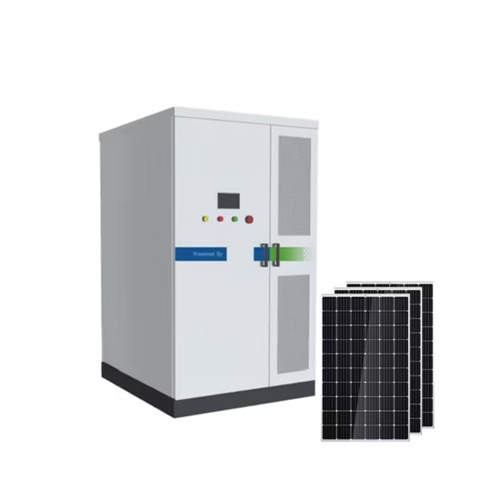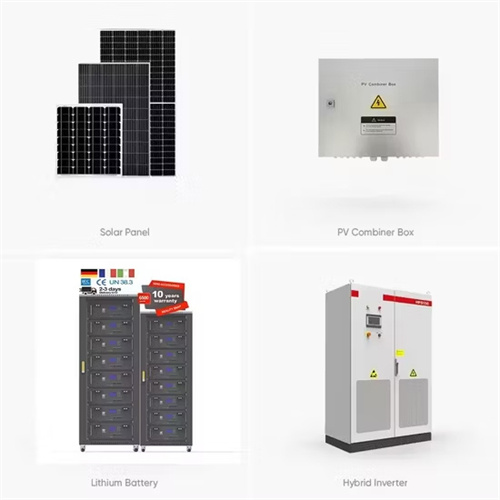Optimal sizing of solar wind hybrid system Laos

Optimal sizing of hybrid solar/wind/hydroelectric pumped
Providing access to clean, reliable, and affordable energy by adopting hybrid power systems is important for countries looking to achieve their sustainable development goals. This paper presents an optimization method for sizing a hybrid system including photovoltaic (PV), wind turbines with a hydroelectric pumped storage system. In this paper, the implementation of

Optimal sizing of a hybrid microgrid system using solar, wind,
This paper presents a model for designing a stand-alone hybrid system consisting of photovoltaic sources, wind turbines, a storage system, and a diesel generator. The aim is to determine the optimal size to reduce the cost of electricity and ensure the provision of electricity at lower and more reliable prices for isolated rural areas.

Optimal sizing of a hybrid microgrid system using solar, wind,
Through all the obtained results, Scenario No. 1 and using the SFS method is the best scenario in terms of the optimal size of the microgrid system, which is represented in the optimal number of the following system components mentioned in the photovoltaic units estimated at N PV = 22 wind turbines N wt = 2 batteries N battery = 8 and diesel

Optimal sizing of a grid-connected hybrid renewable energy
It uses the best technical and economic design and sizing of hybrid electric power system components like wind, PV, battery, and inverter systems, where PV/wind/diesel/battery hybrid setup is best

Modeling, Simulation and Optimal Sizing of a Hybrid Wind, Solar
 This paper reports on the findings of research examining the problem of optimally sizing a hybrid wind and solar renewable energy power system. In the research a target location was first identified and meteorological data collected. "Optimal sizing of an autonomous hybrid system," in Renewable and Sustainable Energy Conference (IRSEC

Optimal sizing of hybrid solar/wind/hydroelectric
Providing access to clean, reliable, and affordable energy by adopting hybrid power systems is important for countries looking to achieve their sustainable development goals. This paper presents an optimization method

Optimization of wind-solar hybrid system based on energy
Wind and solar energy exhibit a natural complementarity in their temporal distribution. By optimally configuring wind and solar power generation equipment, the hybrid system can leverage this complementarity across different periods and weather conditions, enhancing overall power supply stability [10].Recent case studies have shown that the complementary characteristics of

Simultaneous optimal site selection and sizing of a grid
Nguyen et al. [42] have calculated the optimal size for a hybrid system consisting of photovoltaic panels, wind turbines, hydrogen storage devices, and batteries to meet the dynamic energy needs of a wastewater treatment plant. A multi-objective fuzzy decision-making approach is used for optimization. Identification of optimal wind, solar

Optimal Sizing of PV/Wind/Battery Grid-Connected Hybrid
In this paper, the metaheuristic algorithm TLBO was proposed for the optimal sizing of the PV-Wind-Battery based grid-tied hybrid renewable energy system. The main objective is to determine the best suitable configuration of PV panels, wind turbines, and batteries such that LCE is minimized subject to reliability constraint GPAP, SSER, and

Optimal sizing of a wind/solar/battery hybrid grid-connected
Two constraint-based iterative search algorithms are proposed for optimal sizing of the wind turbine, solar photovoltaic and the battery energy storage system (BESS) in the grid-connected configuration of a microgrid to avoid over- and under-sizing. Higher cost and stochastic nature of intermittent renewable energy (RE) resources complicate their planning, integration

Optimal sizing of a wind/solar/battery hybrid
standalone PV, WT and BESS system. In [20], optimal sizes of PV, WT and BESS are calculated based upon multiple-objectives, i.e. high supply reliability, minimisation of cost and full utilisation of complementary characteristics of wind and solar. In [21], optimal sizing of hybrid PV–WT generation system is done based upon the reliability and

(PDF) Optimal Sizing of Hybrid PV/Wind Systems for Grid
Journal of Energy and Power Engineering, 2017. In this paper, an optimized model is proposed to find the best values for decision variables to optimize the grid connected hybrid renewable energy system which consists of photovoltaic panels, wind turbines and battery bank for electrification to Northeast region of Afghanistan to meet winter power shortages of the area.

Optimal sizing of wind/ concentrated solar plant/ electric heater
Simulation results show that WTs are essential to ensure uninterrupted power supply. In [6], optimal sizing of a hybrid renewable energy system composed of WT, solar plant and electric heater has

Optimization and Evaluation of a Stand-Alone Hybrid System
The optimal system consists of a 60 kW wind turbine, a 15 kW diesel generator, and a 5.1 kW converter. Khan, F.A.; Pal, N.; Saeed, S.H. Optimization and sizing of SPV/Wind hybrid renewable energy system: A techno-economic and social perspective. (2024). Optimization and Evaluation of a Stand-Alone Hybrid System Consisting of Solar

A methodology for optimal sizing of autonomous hybrid PV/wind system
A methodology for optimal sizing of autonomous hybrid PV/wind system S. Diaf 1*, D. Diaf2, M. Belhamel2, M. Haddadi 3, A. Louche1 1 Université de Corse CNRS -UMR 6134 Vignola –Route des Sanguinaires, Ajaccio, France Email: sdiaf@hotmail 2 Centre of Renewable Energies Development, B.P. 62 16340 Bouzareah Algiers, Algeria 3 Ecole Polytechnique d''El harrach,

Optimal sizing and techno-economic analysis of a hybrid solar PV/wind
Following the acquisition of site data, a hybrid solar PV, wind, diesel generator, and converter analysis was conducted using HOMER software to establish the appropriate sizing of system

Sizing stand-alone photovoltaic–wind hybrid system: Techno
A methodology is developed to determinate the optimal size of PV-hybrid subsystems and to optimize the stand-alone system management applications to laos. Eng J, 0125-8281, 14 (3) Optimal sizing method for stand-alone hybrid solar–wind system with LPSP technology by using genetic algorithm. Sol Energy (2007), p. 08, 10.1016/j.solener

Optimal sizing method for stand-alone hybrid solar–wind system
The following optimization model is a simulation tool to obtain the optimum size or optimal configuration of a hybrid solar–wind system employing a battery bank in terms of the

Optimal sizing of a wind/solar/battery hybrid grid‐connected
In, optimal sizing of hybrid PV–WT generation system is done based upon the reliability and cost. In [ 22 ], optimal sizes of PV, WT and BESS are determined based upon cost, reliability and emissions, and well known optimisation technique, i.e. particle swarm optimisation (PSO) (see [ 23 ] for PSO) is used to solve the optimisation problem.

Optimal capacity and operation strategy of a solar-wind hybrid
The optimal sizes of the hybrid system were considered under scenarios with different feed-in tariffs. Xu et al. [14] also studied the hybrid system of PV-wind-hydropower with PHS using the multi-objective optimization method. It was found that this system could achieve high reliability and low-cost power generation.

Optimal Sizing of a Hybrid Renewable Energy System: A Socio
Abstract. Unprecedented power outages and load shedding significantly impact power supply reliability in a power distribution network. Furthermore, extending grid availability to far-flung regions with higher distribution losses is not economically viable. Therefore, a hybrid renewable energy system (HRES) is developed, and its socio-techno-economic-environmental

Optimal Sizing of DG Solar Wind Hybrid System Using HOMER
A DG hybrid energy generation model is designed and proposed for institutional area. Hybrid energy system consists PV cells and wind turbine as main source of energy [5,6,7,8] also consist a lead acid battery for power backup and off grid bidirectional converter for AC to DC and DC to AC conversion [9,10,11,12].

A modified multi-objective particle swarm optimization (M
Recent literatures has explored various optimization techniques for hybrid renewable energy systems. In their study, Tian et al. [4] focuses on the multi-objective optimization of a hydrogen-battery hybrid storage system for offshore wind farms using MOPSO.They address the economic costs, the capable degree of smoothing the fluctuations

Optimal sizing, operating strategy and operational experience
An optimal unit sizing method is presented for stand-alone microgrids with practical system and component life-cycle considerations. The proposed method has been applied to the design and development of a real microgrid system on Dongfushan Island, Zhejiang Province, China, consisting of wind turbine generators, solar panels, diesel generators and

Optimal sizing of hybrid PV–Wind–Battery storage system for
A genetic algorithm based improved optimal sizing strategy for solar-wind-battery hybrid system using energy filter algorithm Front Energy, 14 ( 1 ) ( 2020 ), pp. 139 - 151, 10.1007/s11708-017-0484-4

6 FAQs about [Optimal sizing of solar wind hybrid system Laos]
What is the optimal battery size for the hybrid solar–wind system?
Optimal sizing results for the hybrid solar–wind system for LPSP = 1% and 2% It is noteworthy that the optimized battery bank for the LPSP = 2% case turned out to have five strings of batteries, with a total nominal capacity of 5000 Ah (24 V).
How much does a hybrid solar–wind system cost?
Hybrid solar–wind systems usually meet load demands well because of the good complementary effect of the solar radiation and wind speed. The optimal sizing results for the LPSP of 1% and 2% are shown in Table 6, resulting in a minimum annualized cost of system of US$10,600 and US$9,708 respectively.
What is the optimum combination of a hybrid solar–wind system?
The optimum combination of a hybrid solar–wind system can make the best compromise between the two considered objectives: the system power reliability and system cost. The economical approach, according to the concept of annualized cost of system (ACS), is developed to be the best benchmark of system cost analysis in this study.
What are the limitations of a hybrid PV/wind system?
In these systems, the slope angle of the PV system and the installation height of the wind turbine are considered as the limitation of this method 14. This method is used to calculate the optimal size of the battery and the PV system in a hybrid PV/wind system. Wind speed and solar radiation data have been collected daily for 30 years.
What is a techno-economic analysis for stand-alone PV/wind hybrid energy system?
A techno-economic analysis for stand-alone PV/wind hybrid energy system is presented by Celik . This method is complete by Ai et al., which gives more accurate and practical. Also, neural network and genetic algorithm may be used and combined for sizing and controlling hybrid energy system to giving optimum solution , .
Can a hybrid solar–wind system supply power for a relay station?
The proposed method has been applied to analyze a hybrid solar–wind system to supply power for a telecommunication relay station on a remote island along the south-east coast of China. The algorithm is based upon using the weather data of year 1989 as the typical weather year for both wind speed and solar radiation for the site under consideration.
Related Contents
- Wind solar hybrid off grid system Madagascar
- Wind solar hybrid system price Andorra
- Hybrid solar wind kit British Virgin Islands
- Denmark solar and wind hybrid power system
- Wind turbine solar panels hybrid system Monaco
- Mali hybrid controller wind solar
- Fiji hybrid solar wind charger
- Hybrid solar and wind systems Madagascar
- Wind solar hybrid system price in Afghanistan
- Hybrid inverter solar wind Italy
- Greenland wind solar hybrid controller
- Hybrid inverter for solar and wind Latvia